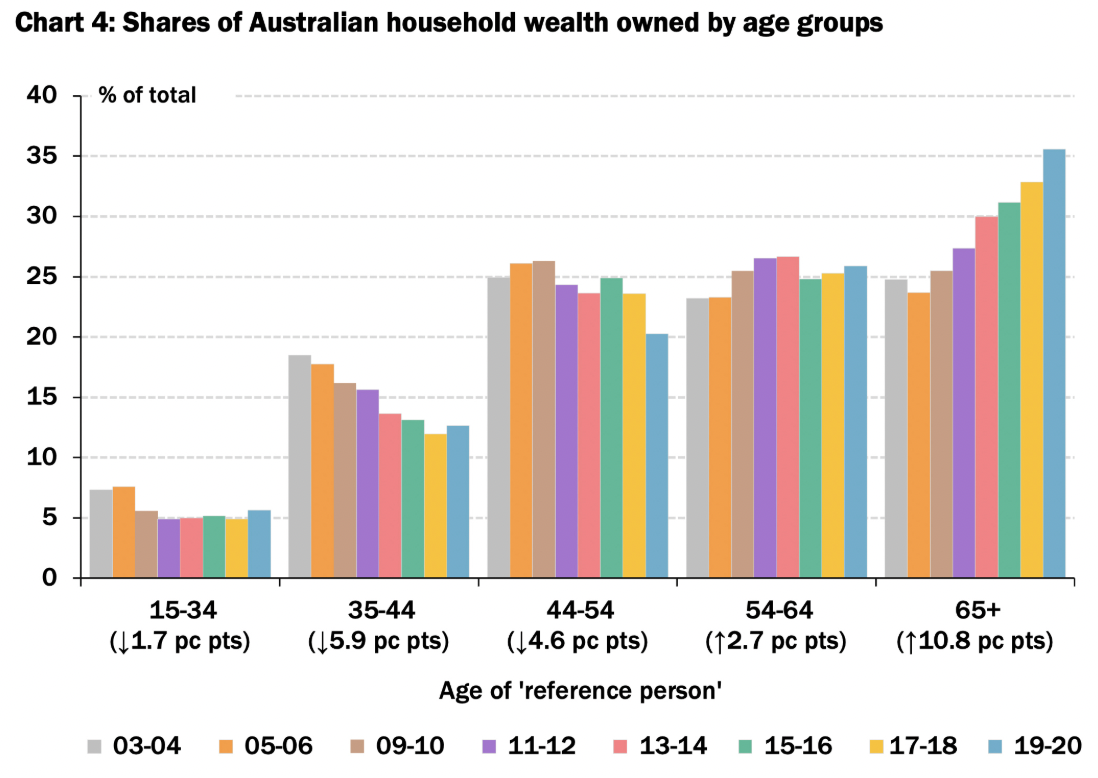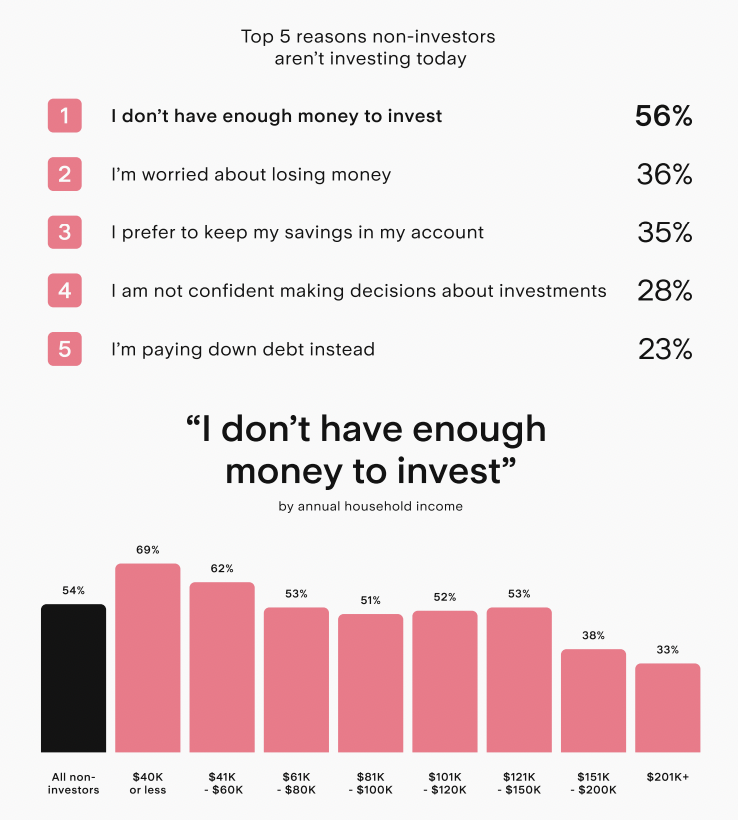How to invest if you're 25 and under
Are you in your 20s and feel like you need to be doing something about your financial future? The data suggests you're not alone.
The World Economic Forum’s Global Retail Investor Outlook 2024 report showed that 30% of Gen Z start investing in early adulthood, a much higher rate than their predecessors (9% for Gen X and 6% for Boomers).
By the time they start working, the vast majority of Gen Z (86%) have also learned about personal investing, compared to only 47% of boomers at the same age.
The 2025 Stake Ambition Report, released by Australian trading platform Stake this week, show similar trends. It found 60% of Gen Z and Millennials are now actively investing, compared to less than half of Gen X and Boomers, based on a survey of 2,000 Australians.
According to Stake's report, 70% of Gen Z and Millennials believe acquiring assets and investments is more important to financial advancement than career progression. More than half of boomers felt the opposite, despite older Australians having a greater share of asset ownership than at any other time in history.

The report also revealed that attitudes to wealth amongst young people have taken a further dramatic turn from traditional expectations. According to Stake's survey, 55% of Gen Z and 49% of Millennials now believe potential inheritance is more important than how hard you work, according to the report.
"Having realised the old system of working hard to buy a house is broken, younger Australians aren’t waiting for a handout; they are turning to investing to build wealth on their own terms," the report states.
"In fact, investors who don’t yet own a home are nearly twice as likely as non-investors to feel they can afford one without an inheritance."
The fact of the matter is that, despite common misconceptions, today's young people are arguably more engaged investors than any generation before them.
There's likely a few reasons for this: the growing accessibility of low-cost trading platforms, more information around investing in general, and also an awareness amongst younger people that issues like housing affordability and current economic conditions mean it's harder for them to grow their wealth in the same way as previous generations.
"A lot of our parents and grandparents grew up in different financial times — when property was seen as the only real way to build wealth, or when cash investments felt safe and reliable," says Julie Bullen, adviser at Fox and Hare, who specialise in financial advice for 20 to 45-year-olds.
"But with today’s higher inflation, being too conservative can actually mean your money goes backwards in real terms."
So if you're a young person looking to get ahead financially, what should you be doing?
Getting started
Growing generational wealth inequality has made the act of getting started more crucial than ever, says Trish Gregory, financial adviser at Hayes and Co.
"The best time to start investing is 20 years ago, the next best time to start investing is right now," she says.
But overcoming the inertia of not investing is easier said than done. But there are three things that can help make the initial leap easier: starting small, being consistent and having clear goals.
"I always start by asking, 'What’s the goal here?' says Bullen. "It’s not just about throwing money into the market — it’s about understanding what you actually want your money to do for you, and when you’ll need it."
She recommends keeping enough cash aside in an emergency savings account, avoiding unnecessary debts or expensive, depreciating purchases. From there, it's about committing to the habit.
"There's a huge psychological aspect to starting to invest," says Gregory. "The biggest considerations for younger people looking to build an investment portfolio - and what I tend to counsel people on - is consistency."
"I definitely see people trying to get it perfect before they start. And I would love people to just start with a smaller amount of money and get a feel for it."
Bullen agrees. "Saving or investing even a tiny amount instead of spending it all makes a huge difference over time," she says. "It’s not about the dollar figure — it’s about the habit. Building the discipline to set something aside early on creates financial confidence and gives you options later."
Your one big advantage
Faced with lower incomes and savings, and higher living costs, investing can seem an impossible dream for many young people.
In fact, not having enough money to invest was the primary reason given by the majority of all non-investors with household incomes below $150,000, Stake's report found.

But by not starting as soon as you can, you're robbing yourself of the one great advantage you have over all other investors - time.
"The biggest thing I try to remind younger clients is that building wealth isn’t about picking the perfect investment or having heaps of money to start," says Burren. "It’s about consistency, making small, smart money choices early, and letting time do the heavy lifting."
"The biggest advantage younger people have is time. Starting early, even with small amounts, lets you take full advantage of compound growth."
For those starting out, it means putting money towards building a broad, passive portfolio may be the best course of action.
"If your focus is long-term wealth creation, that’s when investing in shares makes sense," says Burren. "I usually recommend a passive (or index) investment approach, which basically means buying into a whole market — for example, the S&P 500 or a broad Australian index.
"It keeps things simple, spreads your risk across lots of companies, and lets you benefit from the ups and downs of the market through dollar-cost averaging."
If you're looking for a way to start investing, you could consider either Vanguard or Betashares Direct. Both let you invest in a large range of index funds with no trading fees. Trading platforms like CMC Markets also offer no trading fees on certain stock investments.
What to keep in mind
While it's never been easier to start your investing journey, there's still things you'll need to be wary of.
The first is not to get tempted by too-good-to-be-true investment opportunities or trends. The temptation can be to try and play catch up by chasing higher returns, when it's important to remember that investing is a long-term process. Throwing money away on risky investments also robs you of the natural advantage you currently have - time.
"One of the biggest mistakes I see is trying to chase quick wins or follow the latest online fad," says Bullen. "There’s so much noise out there — everyone seems to have a “can’t-miss” stock tip or a get-rich-quick story on social media."
It's also important to internalise the idea that investing isn't without its risks, and you're likely to experience your fair share of red days. That shouldn't discourage you from investing, says Gregory.
"As long as you're in a diversified portfolio, unless you think the entire world economy is going to collapse, you'll have fluctuations, but you're very unlikely to lose all of your money. It might just dip for a significant period of time."
2 topics

